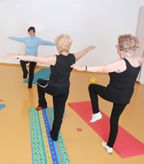Meta-Analysis: Aerobic Exercise Can Help Cancer Patients Overcome Fatigue
An updated assessment of 56 international randomized studies has established exercise as a way to ease fatigue linked to cancer and cancer treatment, reinforcing results of a previous review of 28 studies published in 2008.
An updated assessment of 56 international randomized studies has established exercise as a way to ease fatigue linked to cancer and cancer treatment. The review is published this week, reinforcing the results of a previous review of 28 studies published in 2008.

“The most important finding in the updated [version] is that aerobic exercise is necessary to reduce cancer-related fatigue, whereas resistance training (or strength training) and other types of exercise such as tai chi and yoga do not reduce cancer-related fatigue,” said Fiona Cramp, MD, Faculty of Health and Life Sciences, at the University of the West of England, the lead author of the study.
The number of studies in the review has doubled in the last 4 years, and a greater number of studies have identified fatigue as the primary outcome and the main drive for intervention, said Cramp. “We can be more confident that the results are accurate.”
The Analysis and Results
The analysis included randomized and controlled trials that studied the effect of exercise on cancer-related fatigue among 4,068 adults with cancer. One-half of the studies included were breast cancer patient trials.
The meta-analysis of the consolidated fatigue data showed that aerobic exercise, such as walking or cycling, significantly reduced fatigue for cancer patients compared to no exercise. The benefit was observed both during and post-adjuvant cancer therapy.
“It was not possible to investigate type of adjuvant treatment and whether this had an influence upon the effect of exercise in managing fatigue,” said Cramp. “But the results do suggest that exercise is effective in reducing fatigue in patients with solid tumors both during and after adjuvant cancer treatment.”
This suggests, said Cramp, “that exercise is important in the management of fatigue at all stages in the cancer journey.”
The benefit of exercise was seen for breast and prostate cancer patients. No benefit of exercise was seen for the 114 patients analyzed from four hematological cancer studies.
In contrast to aerobic exercise, other forms of exercise such as resistance training and yoga were not seen to significantly reduce tiredness among cancer patients.
The evidence of the benefits of aerobic exercise is strongest for breast cancer patients. Cramp noted that seven studies of prostate cancer patients also showed reduced fatigue in this patient population.
Future studies need to better understand the cause of cancer-related fatigue and how exercise can relieve the physiological symptoms of fatigue. The effect of specific therapies on tiredness is also worth investigating. The limitations of the review include inclusion of several small trials, a broad range of trials that led to statistical heterogeneity, and specific limitations of each individual study included in the analysis.
As cancer therapies improve, cancer patients are both living longer with their cancer, and the number of cancer survivors is increasing, resulting in a greater need for improvements in quality of life. Fatigue is a major cancer and therapy-related issue that can last well beyond a short-term cancer treatment. Recent studies have demonstrated that exercise, rather than rest, is one way to relieve tiredness. Exercise may also have additional benefits-reducing anxiety and improving a patient’s overall mood and outlook.
“While it is tempting to advise patients to rest when they report extreme levels of tiredness the most important message should be the maintenance of aerobic activities. This can be incorporated into activities of daily living and where possible should be something that the patient enjoys,” said Cramp. As little as a short brisk walk or a bike ride can help. The review showed few adverse events related to exercise as long as patients practice caution. The exercise should be increased gradually, Cramp warned. Immunocompromised patients, for example, should not swim in public pools and those with severe osteoporosis should heed advice of their doctors on beneficial types of activities.
Whether cancer treatments and regimens have become better, therefore, decreasing side effects and increasing quality of life for patients compared to previous therapies is not clear from this review. “My personal opinion is that treatments have improved but, the overall purpose of treatment is to preserve life. Perhaps more importantly health professionals are now more aware of the side effects of treatments and of their patients’ priorities. Improvements in patient quality of life are therefore more likely due to the supportive care that patients are able to access rather than a reduction in the side effects,” said Cramp.
Oncology Peer Review On-The-Go: Cancer-Related Fatigue Outcome Measures in Integrative Oncology
September 20th 2022Authors Dori Beeler, PhD; Shelley Wang, MD, MPH; and Viraj A. Master, MD, PhD, spoke with CancerNetwork® about a review article on cancer-related fatigue published in the journal ONCOLOGY®.